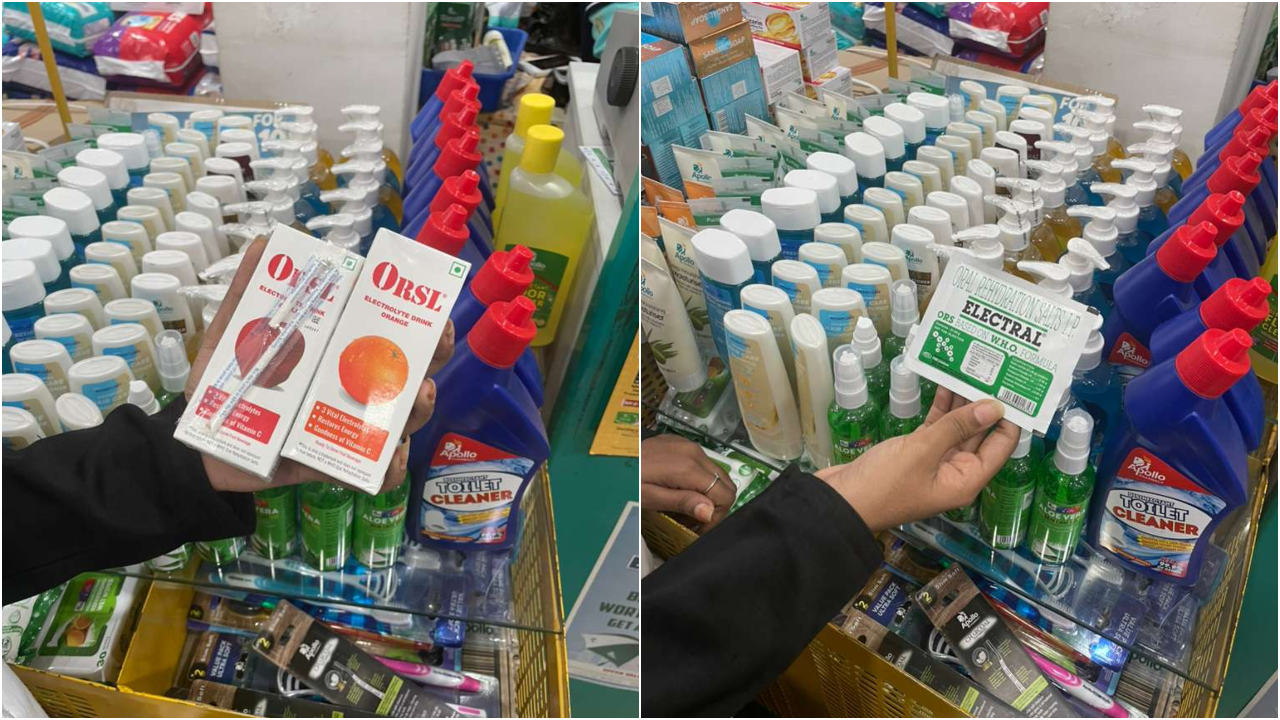Published Nov 01, 2025 | 11:01 AM ⚊ Updated Nov 01, 2025 | 11:01 AM

ORS and ORSL being simultaneously sold in Chennai pharmacies. (Veni EN)
Synopsis: The Delhi High Court upheld FSSAI’s ban on ‘ORS’-labeled beverages, prioritizing public health over commercial interests in Dr Reddy’s Laboratories’ challenge. Justice Datta refused interim relief for selling existing Rebalanz VITORS stock, directing rebranding proposals to FSSAI. The ruling stems from an 8-year campaign against misleading products deviating from WHO standards, affecting brands like ORSL with ₹180 crore inventory.
The Delhi High Court on Friday, 31 October refused to interfere with the Food Safety and Standards Authority of India’s (FSSAI) directive banning the sale of beverages with misleading ‘ORS’ labels, emphasizing that public health considerations must take precedence over commercial interests.
“It is a health hazard…This embargo will continue. I am not doing away with the embargo, considering the public health concerns,” Justice Sachin Datta observed while hearing a petition filed by Dr Reddy’s Laboratories challenging the FSSAI’s October 14 and 15 orders of reporters Bar & Bench.
Justice Datta made it clear that the court would not pass any orders allowing the continued sale or manufacture of products using ‘ORS’ or similar terminology. “Public health considerations are paramount. We can’t pass any orders against it,” the judge stated unequivocally.
The court’s position represents a decisive rejection of pharmaceutical companies’ attempts to continue selling existing inventory or delay implementation of the ban, even as they propose rebranding their products.
Dr Reddy’s Laboratories, which manufactures a product called Rebalanz VITORS, had approached the court after FSSAI withdrew earlier approvals that had allowed the use of ‘ORS’ with prefixes or suffixes in registered trademarks for electrolyte and beverage products.
Counsel for the pharmaceutical giant informed the court that the company has already stopped manufacturing fresh batches and is ready to change the product name. However, they requested permission to sell products already in the market bearing the Rebalanz VITORS mark.
Additional Solicitor General (ASG) Chetan Sharma and Central Government Standing Counsel (CGSC) Ashish Dixit, appearing for FSSAI, opposed this request, maintaining the regulator’s firm stance against any exceptions to the ban.
The court directed Dr Reddy’s Laboratories to make a representation before FSSAI regarding its proposal to rename the product and address the disposal of existing inventory. Justice Datta indicated he would fix timelines for FSSAI to consider and decide on the company’s plea, but reiterated that no interim relief would be granted for continued sales.
The FSSAI notification at the heart of the controversy states that using ‘ORS,’ even with prefixes or suffixes in trademarked names, is misleading and constitutes a violation of the Food Safety and Standards Act, 2006, unless the product complies with WHO formulation standards.
ORS (oral rehydration solution) is a specific term used for formulations recommended by the WHO for treating dehydration, particularly during episodes of diarrhea and vomiting. The WHO formulation has a precise composition designed for medical efficacy, which commercial beverages typically do not match.
During Friday’s hearing, government counsel informed the court about a detailed order passed by FSSAI addressing the representation made by JNTL Consumer Health India, the Indian subsidiary of American company Kenvue and manufacturer of ORSL—one of the most prominent products affected by the ban.
On 17 October, the court had granted interim protection to JNTL, allowing the company to approach FSSAI with its reasons while the food safety body prepared a reasoned order. However, that order was widely misinterpreted on social media as the court permitting food business operators to continue manufacturing and selling ORS-labeled beverages.
On 28 October, while hearing Dr Reddy’s case, Justice Datta had issued strong clarifications that the 17 October consent order was not meant to allow other companies to continue manufacturing and selling such products.
“I would have restrained the manufacturers from manufacturing fresh batches had I known that the FSSAI would take two weeks to take a decision,” the judge had remarked.
“The consent order was passed to enable the FSSAI to take the requisite steps. It wasn’t to allow all these manufacturers to continue manufacturing these products.”
The clarification came after FSSAI itself issued a statement on 23 October dismissing social media claims that it had permitted the disposal or sale of ORSL or given consent for the same.
The regulatory action is the culmination of an eight-year campaign led by Dr Sivaranjani Santosh, a Hyderabad-based paediatrician who has been fighting to prohibit the use of ‘ORS’ terminology in commercial food and beverage products.
Dr Sivaranjani has consistently argued that products like ORSL are misleadingly marketed under medical-sounding names while being high in sugar and nutritionally different from genuine WHO Oral Rehydration Solution—a life-saving formulation used in medical treatment.
Following the court’s various hearings, Dr Sivaranjani had issued public appeals calling on citizens to support the cause against what she described as corporate lobbying. “This is not about brands or business. It’s about protecting lives,” she emphasised in her statements.
The paediatrician, who is also a first aid trainer and social activist, had alleged facing online threats as the legal battle intensified and claimed that companies were attempting to influence media coverage through legal notices.
The ban affects multiple pharmaceutical and food and beverage companies that have marketed electrolyte drinks and beverages using ‘ORS’ or similar terminology in their branding. These products, often marketed as health drinks or rehydration solutions, have been popular in India’s growing functional beverage market.
JNTL’s ORSL brand alone was reported to have existing inventory worth approximately ₹180 crore at the time the ban was announced. Other affected companies include major pharmaceutical players like Dr Reddy’s Laboratories, which now face the challenge of rebranding established products and managing existing inventory.
(Edited by Amit Vasudev)

